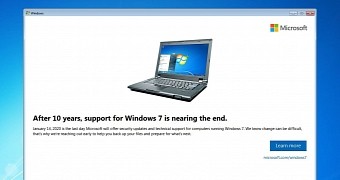Windows 7 reached the end of support on January 14, so Microsoft will only release updates to paying customers, with home users recommended to upgrade to Windows 10 going forward.
But according to the Free Software Foundation, or FSF, this doesn’t have to happen, as everyone can continue receiving updates if Microsoft open sources the operating system and allows the community to maintain it.
“Microsoft's support of Windows 7 is over, but its life doesn't have to end. We call on Microsoft to upcycle it instead,” FSF says in a petition.
FSF accuses Microsoft of way too many wrongdoings with Windows 7.
“On January 14th, Windows 7 reached its official "end-of-life," bringing an end to its updates as well as its ten years of poisoning education, invading privacy, and threatening user security. The end of Windows 7's lifecycle gives Microsoft the perfect opportunity to undo past wrongs, and to upcycle it instead,” the organization says.
Microsoft unlikely to open-source Windows 7
The organization claims that by open-sourcing Windows 7, Microsoft can allow the community to “study, modify, and share” code in the operating system. This would also allow the company to “respect the freedom and privacy” of users, FSF continues.
“We call on them to release it as free software, and give it to the community to study and improve. As there is already a precedent for releasing some core Windows utilities as free software, Microsoft has nothing to lose by liberating a version of their operating system that they themselves say has ‘reached its end,’” the Free Software Foundation adds.
At the time of writing, the petition has nearly 5,000 supporters.
Of course, Microsoft hasn’t responded to the petition, but it goes without saying that you shouldn’t expect the company to open-source Windows 7. There are many reasons the company won’t do this, including the fact that Windows 7 shares much of the code with Windows 10, and open-sourcing the 2009 OS would obviously expose its successors.

 14 DAY TRIAL //
14 DAY TRIAL //